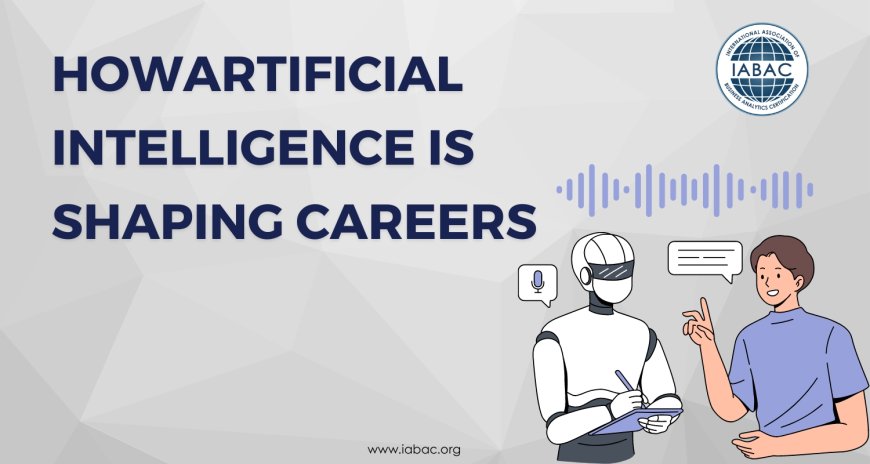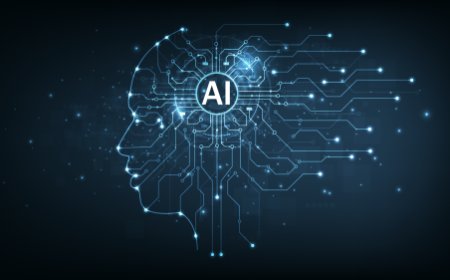How Artificial Intelligence is Shaping Careers
Artificial Intelligence is changing careers by creating new job opportunities and transforming skill needs in different industries.

Artificial Intelligence (AI) means making machines smart like humans. It's about teaching computers to learn, solve problems, and make decisions on their own. This involves creating algorithms and models that let computers understand data, find patterns, and make choices by themselves. AI includes different technologies like machine learning, natural language processing, computer vision, and robotics, which help machines do things that usually only humans can do.
AI is transforming industries, making them more efficient and innovative. In healthcare, AI analyzes medical data to diagnose diseases accurately and create personalized treatment plans. In finance, it's used to detect fraud, assess risks, and automate trading strategies. In transportation, AI optimizes routes and predicts maintenance needs, while in agriculture, it enhances crop yield and reduces waste through precision farming techniques. Retailers leverage AI for inventory management and personalized customer experiences. As AI technologies advance, their adoption is expected to grow, bringing further improvements and efficiencies across diverse sectors.
Ethical Considerations in AI-Driven Careers
AI-driven careers come with ethical responsibilities, especially regarding how AI technologies are developed, deployed, and used. Professionals in this field must consider the potential impacts of their work on society, individuals, and the environment. This includes ensuring fairness, transparency, and accountability in AI systems to prevent biases and discrimination. Ethical considerations also involve protecting user privacy, maintaining data security, and adhering to regulatory frameworks to mitigate risks and uphold ethical standards.
Privacy Concerns and Data Security
Privacy and data security are critical aspects of AI-driven technologies, given the vast amounts of data they often rely on. Professionals working in AI must prioritize protecting user privacy by implementing robust data anonymization techniques, obtaining informed consent for data collection and usage, and ensuring compliance with relevant privacy laws and regulations. Data security measures, such as encryption, access controls, and secure storage, are essential to safeguarding sensitive information from unauthorized access or breaches. By addressing privacy concerns and prioritizing data security, AI professionals can build trust with users and mitigate potential risks associated with the collection and processing of personal data.
How is AI impacting the future of work?
AI is reshaping the future of work in several ways:
-
Automation: AI technologies are increasingly automating routine tasks, leading to changes in job roles and responsibilities. This automation streamlines processes, increases efficiency and frees up human workers to focus on more creative and high-value tasks.
-
Job Transformation: AI is augmenting human capabilities, enabling workers to perform tasks more effectively and efficiently. This augmentation leads to the transformation of job roles, with a greater emphasis on skills such as problem-solving, critical thinking, and emotional intelligence.
-
Skill Requirements: The adoption of AI necessitates a shift in the skill sets required for the workforce. There is a growing demand for skills related to data analysis, machine learning, and programming, as well as soft skills such as adaptability, collaboration, and communication.
-
New Opportunities: While AI may displace some jobs, it also creates new opportunities in emerging fields such as AI ethics, data privacy, and AI governance. There is also a growing demand for roles that involve managing and interpreting AI systems, such as AI trainers, interpreters, and explainers.
-
Remote Work and Collaboration: AI facilitates remote work and collaboration by providing tools for communication, project management, and virtual collaboration. This enables distributed teams to work together effectively, regardless of geographical location.
Overall, AI is driving significant changes in the future of work, influencing job roles, skill requirements, and work processes. By embracing these changes and adapting to new technologies, workers can remain competitive in the evolving labor market.
How can individuals adapt to thrive in AI-driven careers?
Individuals can adapt to thrive in AI-driven careers by focusing on developing a combination of technical and soft skills, staying updated on industry trends, and fostering a growth mindset. Here are some key strategies:
-
Continuous Learning: Embrace a mindset of lifelong learning to stay updated on the latest advancements in AI technologies, tools, and methodologies. Invest time in formal education, online courses, workshops, and self-study to build and expand your skill set.
-
Develop Technical Skills: Acquire proficiency in technical skills relevant to AI-driven careers, such as programming languages (e.g., Python, R), machine learning algorithms, data analysis, and deep learning frameworks (e.g., TensorFlow, PyTorch). Gain practical experience through hands-on projects and real-world applications.
-
Cultivate Soft Skills: Develop soft skills such as critical thinking, problem-solving, creativity, adaptability, and communication. These skills are essential for effectively collaborating with multidisciplinary teams, understanding user needs, and translating technical concepts into actionable insights.
-
Specialize in Niche Areas: Explore niche areas within the AI domain where you can develop specialized expertise. This could include fields such as computer vision, natural language processing, robotics, AI ethics, or data privacy. By becoming an expert in a specific niche, you can differentiate yourself in the job market and contribute valuable insights to projects and teams.
-
Build a Professional Network: Engage with AI communities, attend industry events, and participate in online forums to connect with peers, mentors, and industry experts. Networking can provide valuable opportunities for learning, collaboration, and career advancement.
-
Stay Ethically and Socially Aware: Recognize the ethical and societal implications of AI technologies and strive to develop solutions that prioritize fairness, transparency, and accountability. Stay informed about ethical guidelines, data privacy regulations, and best practices for responsible AI development and deployment.
By adopting these strategies and embracing a proactive approach to skill development and learning, individuals can position themselves to thrive in AI-driven careers and contribute meaningfully to the advancement of the field.
Ethical Considerations and Data Security in AI Careers
AI-driven careers come with ethical responsibilities, especially regarding how AI technologies are developed, deployed, and used. Professionals in this field must consider the potential impacts of their work on society, individuals, and the environment. This includes ensuring fairness, transparency, and accountability in AI systems to prevent biases and discrimination. Ethical considerations also involve protecting user privacy, maintaining data security, and adhering to regulatory frameworks to mitigate risks and uphold ethical standards.
Privacy and data security are critical aspects of AI-driven technologies, given the vast amounts of data they often rely on. Professionals working in AI must prioritize protecting user privacy by implementing robust data anonymization techniques, obtaining informed consent for data collection and usage, and ensuring compliance with relevant privacy laws and regulations. Data security measures, such as encryption, access controls, and secure storage, are essential to safeguarding sensitive information from unauthorized access or breaches. By addressing privacy concerns and prioritizing data security, AI professionals can build trust with users and mitigate potential risks associated with the collection and processing of personal data.
AI is changing careers by automating tasks, creating new job roles, and requiring new skills. Individuals need to adapt to these changes and take advantage of opportunities in the AI era by continuously learning, developing technical and soft skills, and staying adaptable. However, it's crucial to remember the ethical implications of AI deployment, including privacy concerns and data security, to ensure a sustainable future of work. By prioritizing ethical AI practices, we can build trust, protect privacy, and create a work environment that benefits everyone.
































